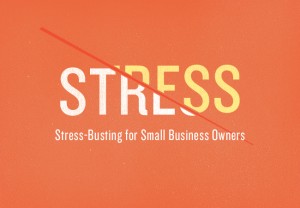Strategies to Solve Stress in Small Business
- April 30, 2016
- blog, Change, Stress, Systems
- 0 Comments
When you become a business owner, you no longer have one single job description. Instead, especially in the early days, you can be working lots of roles. With them come unforeseen challenges, often out of your control. As a result, stress can creep in – for the sake of your health, your business and your loved ones –
One way is identifying the common stressors so you can address them proactively – like the miners who relied upon the canaries to alert them of methane or carbon monoxide in the mines. The canary would die before the levels of the gas reached those hazardous to humans. In the same way (but not risking any of our feathered-friends) you need to identify your stress hazards in advance, be self-aware and manage them.
Stress for Business Owners Can Include:
A lack of control
We deal with customers, suppliers, late payers, government red tape, paperwork, team members, cash flow…the list goes on, and often it can feel as if you have little to no say. To help manage this, consider accepting that not all decisions will go your way and aim to have a positive outlook when they don’t. Appreciating your wins and accepting what you can’t control can help calm frustrating situations.
Reacting too soon
Often people react to situations without actually taking actions to better support them. Reactions are often emotionally driven and do not effectively support business decisions. To help ease the urge to react to something, take time to listen, analyse the situation, consider multiple responses to it and breathe. If it’s a good decision today, it will be a good decision tomorrow.
No time to do it all
Firstly, define what “doing it all” means. In all likelihood, what you want to get done couldn’t be achieved working 24/7 anyhow. So be kind to yourself. Acknowledge you can only do so much in one day. Accept that your health – including sleep, exercise and eating habits – contributes to your overall professional performance, allowing you to better manage your day-to-day stresses. Budgeting time to work out, allocating certain hours for family and / or friends only and choosing not to check emails during certain hours of the day are all proven ways to help manage a busy workload and eliminate stress.
Cash Flow
The largest small business stressor is cash flow uncertainty: what sales are coming in, knowing that bills and employees need to be paid. The first step is to look at improving systems and structures so you can feel more confident in your cash flow: shorten your receivables period; identify payment disputes fast; maintain great customer relations to minimise such disputes; look at ways to take payments up front; and watch your accounts payables closely.
Other small business stressors include
- isolation and lack of social support

- presenteeism where you continue to work even if you aren’t well, because if you are away the business doesn’t happen
- long hours which may be even a bigger problem than in the corporate world
- blurring of boundaries between home and work
- business failure, which also carries a suicide risk
Systems and support go a long way to easing the stress burden on a small business. I recommend joining a business group where you can meet other owners and discover they are battling their share of stresses too. Often it is the ‘business success’ mask we assume when things are tough that can cause the greatest damage. That’s why at Bx we are so passionate about building a community of business owners who can learn and grow together through their shared experiences.
There’s loads of tools to get your website working harder and your marketing to get results. Bx coaching can help you find the right tools for your business and pave the way for your success. Call Bx on 1300 068 229 or find out about our Business for Life Program..



 what you’ve always done, and you’ll keep getting the same results
what you’ve always done, and you’ll keep getting the same results